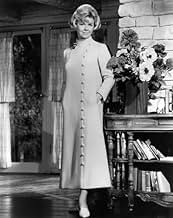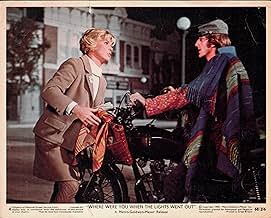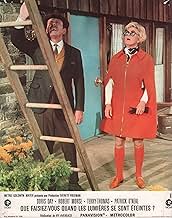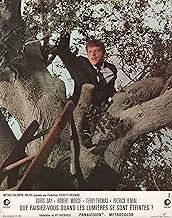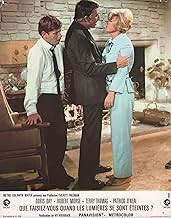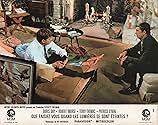Che cosa hai fatto quando siamo rimasti al buio?
Titolo originale: Where Were You When the Lights Went Out?
VALUTAZIONE IMDb
5,8/10
1003
LA TUA VALUTAZIONE
Aggiungi una trama nella tua linguaDuring a blackout, a New York executive crosses paths with a Broadway actress and her husband.During a blackout, a New York executive crosses paths with a Broadway actress and her husband.During a blackout, a New York executive crosses paths with a Broadway actress and her husband.
- Regia
- Sceneggiatura
- Star
- Premi
- 1 candidatura in totale
Murray Alper
- Passenger
- (non citato nei titoli originali)
Hy Averback
- Newscaster
- (non citato nei titoli originali)
Larry Barton
- Minor Role
- (non citato nei titoli originali)
Recensioni in evidenza
Only the most ardent DORIS DAY fan could find this one even bearable to watch. When one thinks of the wealth of material available for a story about New York City's most famous blackout, a film that could have dealt with numerous real-life stories of what people had to cope with, this scrapes the bottom of the barrel for lack of story-telling originality.
Once again Doris is indignant because she suspects she may have been compromised on the night of the blackout when she returned to her Connecticut lodgings, took a sleeping potion and woke up in the morning with a man who had done the same, wandering into the house by mistake.
Nobody is able to salvage this mess--not Doris, not ROBERT MORSE, TERRY-THOMAS, PATRICK O'NEAL or LOLA ALBRIGHT. As directed by Hy Averback, it's the weakest vehicle Day found herself in, committed to do the film because of her husband's machinations and unable to get out of it. Too bad.
Once again Doris is indignant because she suspects she may have been compromised on the night of the blackout when she returned to her Connecticut lodgings, took a sleeping potion and woke up in the morning with a man who had done the same, wandering into the house by mistake.
Nobody is able to salvage this mess--not Doris, not ROBERT MORSE, TERRY-THOMAS, PATRICK O'NEAL or LOLA ALBRIGHT. As directed by Hy Averback, it's the weakest vehicle Day found herself in, committed to do the film because of her husband's machinations and unable to get out of it. Too bad.
There was a time when you could send $25 to Doris Day's animal foundation, and she'd send you an autographed picture. Well, my dog was a cute shelter terrier that I named Griffin, and since this was one of my favorite films, I asked and she agreed to sign her picture "Where Were You and Griffin When the Lights Went Out?"
I like this movie. I even found the movie poster for this film at an antique shop in Myrtle Beach. It's rather cool with Ms. Day posing as if she is the Statue of Liberty.
I paid only $8 for it. It's the only thing I remember from that specific beach trip. I also own the video. I don't think the film can air right now due to legal stuff.
I have watched it a dozen times. It's a feel good movie. It has a lot of nice, fun people in it, even in the minor roles. This includes Steve Allen, Pat Paulson, Jim Backus, Ben Blue, Robert Emhardt and Morgan Freeman in an uncredited role.
About Doris Day.....she was gifted, versatile, and very underrated. Groucho Marx once said he knew Doris before she was a virgin. He was referring to her sunny, innocent girl next door image--which gets the one-two punch in this film, to great effect. Day plays a Broadway actress starring in the Constant Virgin, and most of the film discusses whether she sullied her marriage and herself by sleeping with Robert Morse during the NYC blackout from 1965.
This movie isn't Shakespeare. Just relax and enjoy the goings on. Turn back your mental clock to 1968. It's a well remembered time when people drove big Chrysler convertibles. Plus, Lola Albright wears a dark wig and seduces Patrick O Neal with the line "I like big buildings." The Letterman sing the catchy title tune, I wish they would have put it on their LPs from that period. Terry-Thomas and Robert Morse comment on the space between their teeth. Discussing failed dental work between these two actors was entirely unexpected.
Some of the reviews in this group suggest the movie is terrible and Day's star was in decline. They are not being fair. I believe people stay away from terrible movies and terrible movies lose money. This movie was actually a big earner in 1968. Yes, It's true that this is Day's next to last film before she went to TV. However, her last film "With Six You Get Eggroll" was released later in the same year AND was more profitable than this one.
In defense of Ms. Day's star power, the business did not leave Day. She left the business. All good things eventually end. The world is now less bright without Day.
I like this movie. I even found the movie poster for this film at an antique shop in Myrtle Beach. It's rather cool with Ms. Day posing as if she is the Statue of Liberty.
I paid only $8 for it. It's the only thing I remember from that specific beach trip. I also own the video. I don't think the film can air right now due to legal stuff.
I have watched it a dozen times. It's a feel good movie. It has a lot of nice, fun people in it, even in the minor roles. This includes Steve Allen, Pat Paulson, Jim Backus, Ben Blue, Robert Emhardt and Morgan Freeman in an uncredited role.
About Doris Day.....she was gifted, versatile, and very underrated. Groucho Marx once said he knew Doris before she was a virgin. He was referring to her sunny, innocent girl next door image--which gets the one-two punch in this film, to great effect. Day plays a Broadway actress starring in the Constant Virgin, and most of the film discusses whether she sullied her marriage and herself by sleeping with Robert Morse during the NYC blackout from 1965.
This movie isn't Shakespeare. Just relax and enjoy the goings on. Turn back your mental clock to 1968. It's a well remembered time when people drove big Chrysler convertibles. Plus, Lola Albright wears a dark wig and seduces Patrick O Neal with the line "I like big buildings." The Letterman sing the catchy title tune, I wish they would have put it on their LPs from that period. Terry-Thomas and Robert Morse comment on the space between their teeth. Discussing failed dental work between these two actors was entirely unexpected.
Some of the reviews in this group suggest the movie is terrible and Day's star was in decline. They are not being fair. I believe people stay away from terrible movies and terrible movies lose money. This movie was actually a big earner in 1968. Yes, It's true that this is Day's next to last film before she went to TV. However, her last film "With Six You Get Eggroll" was released later in the same year AND was more profitable than this one.
In defense of Ms. Day's star power, the business did not leave Day. She left the business. All good things eventually end. The world is now less bright without Day.
Doris Day and Patrick O'Neal are husband and wife in this permissive comedy based on a stage play with Terry-Thomas as a stinker, playing a Hungarian but apparently with received pronunciation.
A young man is passed over for promotion by the bosses stupid son so he hatches a plan to steal the companies dividends. When there is a black out in New York, he has difficulty escaping and ends up sleeping with Doris Day.
Its a jolly and pretty well made film and I'm don't really understand all the negative comments. Perhaps because it's a foreign script, or because it's not dripping in gee-schucks All-American schmaltz like the other Doris Day films ?
Product placements - Kodak, The New York Times and Pan- Am. The Kaiser Group (Checker) provided the vehicles, an S series Valiant breaking down.
A young man is passed over for promotion by the bosses stupid son so he hatches a plan to steal the companies dividends. When there is a black out in New York, he has difficulty escaping and ends up sleeping with Doris Day.
Its a jolly and pretty well made film and I'm don't really understand all the negative comments. Perhaps because it's a foreign script, or because it's not dripping in gee-schucks All-American schmaltz like the other Doris Day films ?
Product placements - Kodak, The New York Times and Pan- Am. The Kaiser Group (Checker) provided the vehicles, an S series Valiant breaking down.
Although Where Were You When The Lights Went Out is based on a French sex farce I doubt the original play was anything like this film. Especially since there is no French equivalent for Doris Day, no such thing as a virgin, an all French version on their big screen.
I well remember the 1965 blackout on the East Coast, just settling down to dinner with my parents and everything electric went out. But we didn't have half the adventures this cast had.
Doris plays herself essentially, an actress with an All American virgin image locked into a long running play with neurotic director Terry-Thomas at the helm and married to Patrick O'Neal an architect. When the blackout strikes there's no evening performance and Doris returns home to find O'Neal with magazine writer Lola Albright who had been doing a feature interview with them before she left for the theater.
In the meantime a jealous Robert Morse being passed over for promotion by his boss Robert Emhardt's idiot son steals two million in cash, something he had been planning for a while. The blackout puts a real crimp into his getaway plan.
All the principle players manage to wind up at Doris and Pat's Connecticut home and the bedroom comedy begins.
It wasn't the Code that put a damper on this film, it was rather Doris Day and the studio's attempt to remain true to the virginal image that her public expected. This was one of those films toward the end of her career that her husband Marty Melcher put her in to recoup monies he had made bad investments with, her money.
Where Were You When The Lights Went Out has not worn well over the years. Doris was carrying a heavy load here.
I well remember the 1965 blackout on the East Coast, just settling down to dinner with my parents and everything electric went out. But we didn't have half the adventures this cast had.
Doris plays herself essentially, an actress with an All American virgin image locked into a long running play with neurotic director Terry-Thomas at the helm and married to Patrick O'Neal an architect. When the blackout strikes there's no evening performance and Doris returns home to find O'Neal with magazine writer Lola Albright who had been doing a feature interview with them before she left for the theater.
In the meantime a jealous Robert Morse being passed over for promotion by his boss Robert Emhardt's idiot son steals two million in cash, something he had been planning for a while. The blackout puts a real crimp into his getaway plan.
All the principle players manage to wind up at Doris and Pat's Connecticut home and the bedroom comedy begins.
It wasn't the Code that put a damper on this film, it was rather Doris Day and the studio's attempt to remain true to the virginal image that her public expected. This was one of those films toward the end of her career that her husband Marty Melcher put her in to recoup monies he had made bad investments with, her money.
Where Were You When The Lights Went Out has not worn well over the years. Doris was carrying a heavy load here.
On November 9, 1965 much of the eastern seaboard suffered a power outage and this included huge sections of New York City. To that effect, this film involves several fictional characters who had their lives severely impacted by this development. The first character by the name of "Waldo Zane" (Robert Morse) who works as the treasurer for a large corporation and has just stolen $2 million from it. His escape plan, however, didn't factor in a massive blackout and because of that he winds up at a house in Connecticut trying to get transportation to Boston. In the meantime, an actress on Broadway named "Margaret Garrison" (Doris Day) has had her play cancelled due to the electric shortage and upon heading back to her apartment finds her husband "Peter Garrison" (Robert O'Neal) alone with an attractive journalist by the name of "Roberta Lane" (Lola Albright). Furious at his indiscretion she decides to cancel her planned retirement and heads to her house in Connecticut to consider a divorce. Delighted with this new development her manager "Ladislaus Walichek" (Terry-Thomas) immediately gets in his car and also heads to Connecticut in order to get her to sign a new contract before she changes her mind. Meanwhile, Peter--who is desperate to get back in good graces with his wife--decides to drive to Connecticut to beg for her forgiveness. What he isn't prepared for, however, is the turmoil created when all of the characters show up at his house at around the same time. Now rather than reveal any more I will just say that this was an okay film which had a fairly entertaining plot but was diminished somewhat by rather flat performances by everyone involved. It also didn't help to have the character of Peter Garrison being as unlikeable as he was either. In any case, those interested in a standard comedy from this particular time period might find it amusing to a certain extent and I have rated it accordingly. Average.
Lo sapevi?
- QuizThere appears to be a rights issue tied up with the issuing of this film. While it was a television staple for many years and was released on videocassette several decades ago, it has not been televised or released in digital format since that time. As of 2018, the film has been out of circulation for nearly 25 years.
- BlooperWhen Margaret is sitting on the couch during her interview, the yellow cushions beside her keep moving.
- Citazioni
Margaret Garrison: [repeated line]
Margaret Garrison: Hello, Peter, so you're here!
- ConnessioniFeatured in Lionpower from MGM (1967)
- Colonne sonoreWhere Were You When The Lights Went Out?
Words by Kelly Gordon
Music by Dave Grusin
Performed by The Lettermen
[Title song played over the opening titles and credits, with a reprise played over the end credits]
I più visti
Accedi per valutare e creare un elenco di titoli salvati per ottenere consigli personalizzati
- How long is Where Were You When the Lights Went Out??Powered by Alexa
Dettagli
- Data di uscita
- Paese di origine
- Lingue
- Celebre anche come
- Where Were You When the Lights Went Out?
- Luoghi delle riprese
- Azienda produttrice
- Vedi altri crediti dell’azienda su IMDbPro
Botteghino
- Lordo Stati Uniti e Canada
- 7.988.000 USD
- Tempo di esecuzione
- 1h 29min(89 min)
- Mix di suoni
- Proporzioni
- 2.35 : 1
Contribuisci a questa pagina
Suggerisci una modifica o aggiungi i contenuti mancanti

